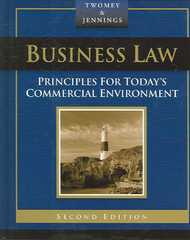Question
In wealth of nation, Smith speaks of his view on human nature, the propensity of exchange and the division of labour (Book I, Chapter I
In wealth of nation, Smith speaks of his view on human nature, the propensity of exchange and the division of labour (Book I, Chapter I & II) and relate these three concepts together. What is the best argument against this chain of relation.
the chain of relation: Due to self-love, we want other goods. But when we want to get goods from other people, we cannot just consider our need. What matters is the need of other people. We have to satisfy the need of other people in order to get what we need. Thus "exchange" happens.
Example: Our dinners come from butcher, brewer and baker, but the motivation that drives them to make food and sell to us is self-interest, but not benevolence."It is not from the benevolence of the butcher, the brewer, or the baker that we expect our dinner, but from their regard to their own interest. We address ourselves, not to their humanity but to their self-love, and never talk to them of our own necessities but of their advantages." (The Wealth of Nations, Book I, Chapter II).
You are not the only one who would want to gain more. Everyone wants to sell more goods, thus competition arises. If one wants to gain more, then he has to do the job that is most suitable for him. So, eventually, everyone works in a suitable situation in a society (division of labour). A perfect line of production is spontaneously created.
Step by Step Solution
There are 3 Steps involved in it
Step: 1

Get Instant Access to Expert-Tailored Solutions
See step-by-step solutions with expert insights and AI powered tools for academic success
Step: 2

Step: 3

Ace Your Homework with AI
Get the answers you need in no time with our AI-driven, step-by-step assistance
Get Started


